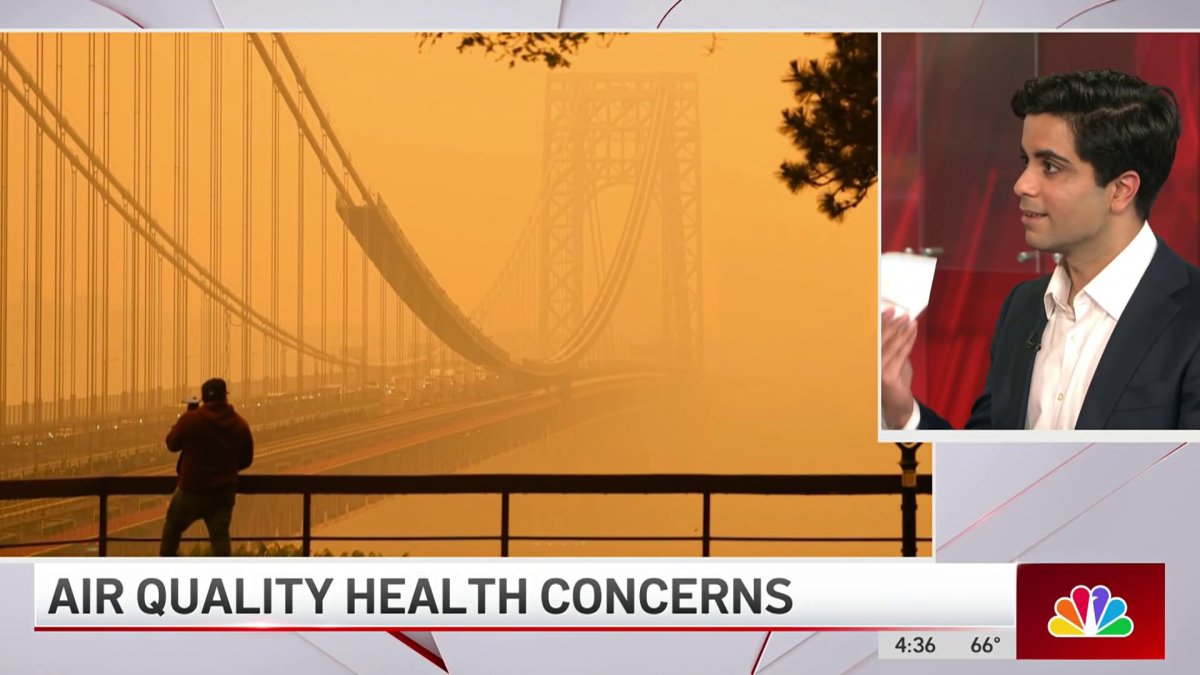
NBC News medical contributor Dr. Akshay Syal explains why at-risk individuals like pregnant people and those with respiratory issues need to take extra precautions as wildfire smoke from Canada blanket the region.
Air quality levels are nearing back to normal levels for the New York City area after a haze of smoke from wildfires in Canada blanketed the tri-state area for the past few days.
Air quality alerts have been extended through Friday night as smoke continues to linger in the tri-state, albeit at much-reduced levels compared to the past two days.
However, another wildfire has sparked in New Jersey.
The New Jersey Forest Fire Service on Friday afternoon alerted the public to a fire in Browns Mills, Burlington County.
Get Tri-state area news and weather forecasts to your inbox. Sign up for NBC New York newsletters.
Nationally, almost nine out of 10 wildfires are caused by humans, according to the U.S. Department of Interior's Office of Wildland Fire which oversees a program that manages 535 million acres of public and Tribal lands.
In an effort to spread knowledge and safety tips to prevent and mitigate wildfire, the U.S. recognizes May as National Wildfire Awareness Month.
With wildfires wreaking havoc on the environment and on our health, and with summer bringing along a higher risk of fires due to drier, hotter conditions and more activities outdoors (including camping and even Fourth of July celebrations), here are a few tips from the Department of Interior on what we can do to prevent wildfires:
- Check weather and drought conditions since this conditions can impact flammability. Additionally, according to the Department of Interior, if it is hot, dry and windy, you should avoid any activities that involve fire or sparks since there is a higher risk of a fire being ignited and spreading.
- Build your campfire in an open location and far from flammables like logs, brush, dried leaves and needles and make sure to extinguish it properly. Additionally, the Department of Interior recommends scraping away grass, leaves and needles down to the soil, as well as staying near your fire, among other tips.
- Douse your campfire until it’s cold to make sure there are no hot spots or flyaway embers. The department suggest throwing a cold bucket of water on the campfire, stirring it, and throwing a second bucket onto it. You should check to make sure that the campfire, once extinguished and doused, is cold to the touch.
- Keep vehicles off dry grass, this includes not only avoiding driving but parking on dry grass. Why? According to the Department of Interior, it's because a vehicle's exhaust can get incredibly hot -- reaching more than 1,000 degrees!
- Regularly maintain your equipment and vehicle to avoid vehicles shooting up sparks which can ignite dry grass.
- Practice vehicle safety by carrying a shovel, bucket and a fire extinguisher in your vehicle.
- Check your tires, bearings and axles on your trailer.
- Keep sparks away from dry vegetation.
- Check conditions and regulations before you use fireworks or consider safe alternatives.
- Cautiously burn debris and never when it’s windy or restricted.
Additionally, the American Red Cross also recommends never throwing into the environment used matches or cigarette butts. Rather, they should be disposed of in a closed container or cup of water. Lighters and matches should also be kept out of the reach of children.